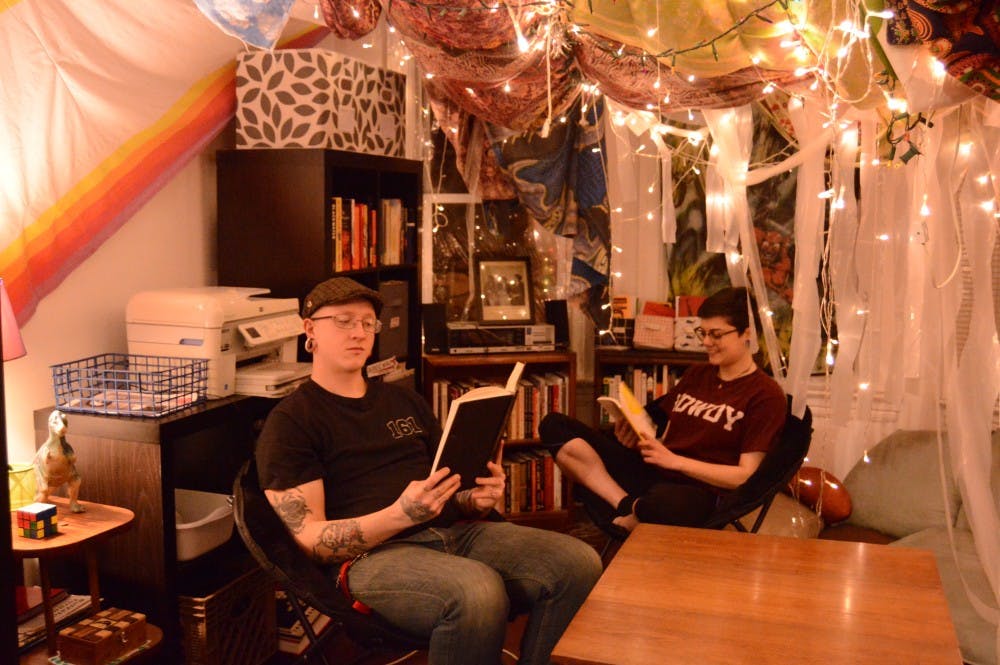The Nickel City Housing Cooperative holds its potluck dinner on Monday or Wednesday nights, where a mix of people sit around a large dinner table eating a vegetarian meal, almost like a family.
But they are not family, they are a co-op.
A co-op house is a cooperative living situation where residents each own a share of a house. The residents each take part in the financial, upkeep and cultural matters of the house.
Co-ops attract younger adults — 20 to 30 years old — with the relatively low cost in rent and shared community living aspect.
Pasquale Raico, a Ph.D. candidate in the mathematics department, is a resident of the Nickel City Housing Cooperative.
“It’s not the cheapest housing in the city,” Raico said. “But it’s cheaper than most other places.”
The Nickel City Housing Cooperatives are the oldest-standing co-ops in Buffalo, located in the Allentown and Elmwood areas.
Other than a few graduate students, there are not many students, living in the Buffalo co-ops, said resident Abby Poletz. Poletz said that co-ops for college students are common in other cities, but not in Buffalo.
“I think the majority of co-ops in the U.S. are all student co-ops, usually undergrad,” Poletz said. “I think in Austin and Ann Arbor there are about 10 or 12 [North American Students of Cooperation] co-ops.”
“Co-ops tend to attract a more liberal or left group of people,” Raico said. “So I think there tends to be more discussion in terms of equitability. But it really depends on the group of people living there at the time, and it can easily turn into a ‘bro-op.’”
With a co-op, the residents collectively make and change the rules of living rather than a landlord or company. This includes everything from chores and maintenance, to new residents moving in and financial matters.
If a resident cannot pay their part of the mortgage for the month, the house decides how that individual can make up for that payment in the future.
“You've got five days after the first of the month to pay your lease payment,” Bob Cook, an eight-year resident said. “If you don't, within that time, you need to go to the treasure and say, ‘I can't make this payment, I'd like to set up a payment plan.”
There are two houses in the Nickel City Housing Cooperative –– Ol’ Wondermouth and Plankton. Ol’ Wondermouth was founded in 2000 and branched off to form the second house, Plankton in 2006, according to Bob, an eight-year resident of Plankton.
“Plankton was started because more people needed a cooperative living situation than what was available,” said Cook. “And that is still true.”
Raico said individuals sometimes use the Nickel City Housing Co-op as an incubator or jumping off point to start their own co-op houses.
One example of this is the Queer Communist Community Center, or the Q3C. Several former residents founded an independently owned co-op almost two years ago with the goal to create a safe space for queer and trans people that share similar political values.
Oscar Elliot, a resident at Q3C, says that the community has been an important part of his mental health.
“I've always been really interested in investing cooperative living,” Oscar said. “Just for me personally, it's much harder for me not to live with other people. I've tried living alone and it's not great.”
Gregory Hall, a Ph.D. candidate in the sociology department, said that many college students he has interacted with struggle with rent costs. While co-ops might be a good alternative housing option for middle class students, other demographics struggle more with finding affordable housing.
“It’s usually, from my experience, men that are minorities between the ages of 18 to their early 40s that have difficulty finding affordable housing,” Hall said.
Hall said that he isn’t sure if these housing co-ops would appeal to these demographics, and that the cultures are not necessarily for everyone.
“These [co-ops] seem to be definitely branding it for a certain type of renter,” Hall said. “I don't know the idea of vegan potlucks would make you feel like you would fit it. I don’t even know if I would be comfortable in that type of environment.”
Isabella Nurt is the assistant features editor and can be reached at: isabella.nurt@ubspectrum.com& @Nurt_Spectrum.
Isabella Nurt is a junior film production major. She is keen to get off campus and cover underground topics in the greater Buffalo area.






